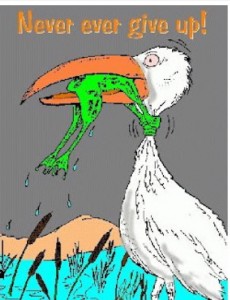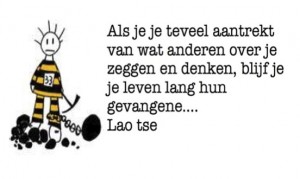Archive for month: January, 2015
weeping
/by Henny BosTranen hebben iets heiligs.
Ze zijn geen teken van zwakte
maar van kracht.
Ze zijn boodschappers van
groot verdriet en
van onuitsprekelijke liefde
Washington Irving
performance anxiety
/by Henny BosOver de waarde van onze fouten – deel 3
/by Henny BosWhen you see the imperfection in the other, first think of your own imperfection and continue on your way from transformation to self-realization, doing yourself and your environment a favor.
Von Dürckheim writes: "The three basic errors of man that Buddhism always emphasizes: onwetendheid, desire and hate are therefore only consequences of attachment.
I have looked up a number of statements about mistakes for you, among others: "A mistake that humbles a man is better for him than a good deed that makes him vain" and "The greatest mistake is to be unaware of any mistake" and "In the relationship of man to man, confession of error is always something that brings you closer 'and' Anyone who acknowledges a mistake proves that he has become a bit more sensible today than he was yesterday 'and' Anyone who feels stepped on when a mistake is brought to his attention lacks the qualities to move forward and "There is hope for those who know their mistakes, no hope for those who don't want to admit it ". Confucius zei: "Do you see a good person trying to emulate him, do you see a bad person look for your faults in yourself ".
Learning from your own mistakes is smart, but learning from others' mistakes is even smarter. You do not have to pay the tuition fee. Because of the other person's mistakes, which we usually have a good view of, we come to the awareness of our own mistakes, which we usually don't have a good view of. We see the splinter in the eye of the other person and not the beam in our own eye, says the Bible.
The environment can serve as a mirror for ourselves. Do not blame the other person for his mistakes, but rather thank him for drawing your attention to his own mistakes, allowing you to progress.
Thomas à Kempis writes: "Because you fear contempt, you do not want to be corrected for mistakes, and you seek a shadow of apology.". We often blame the other person for pointing out our mistakes, while we should be thankful for it. The other person who points out our mistakes dares to take the risk of a conflict with you and will certainly care about you and wants the best for you.
A complaint is free advice that we should take to heart. I think it's a big mistake just to be looking for confirmation, erkenning, appreciation and compliments. All those things only lock you in so that you remain who you are and not grow, you don't develop. And everything was not growing is dead.
A true friend is willing to point out your mistakes, which you can take advantage. A true friend is willing to enter into a possible conflict with you because you don't leave him indifferent. You don't easily point out a stranger to his mistakes, you just walk on. Most customers don't complain, they just walk away…Cayce writes: "Get the profit out of your mistakes: impatience can indicate idealism, fretful nature on passion, disorganization can indicate spontaneity ". I know someone who is very chaotic, but the advantage of this is that she is also very creative and resourceful..
I was also very impatient, everything had to be done quickly and therefore awareness could not attach itself to the experience. I was annoyed with people who were slow and tried to push them up instead of leaving them in their value…I was the norm, the world revolved around me, I was so self-centered and convinced that I was doing well, so no reason for self-observation and change to discover how it really was. I was not so concerned with truth and lived in an illusion with the image that life was finite and so a lot had to be done quickly.
There was a must behind it was unfree, I was edgy and uptight and screamed at myself. After the crisis, I was very interested in books about NDE Near-Death Experiences, because I felt I had been dead myself. Goethe gods: "Stirb und werde" and I understood that now. I also became very interested in philosophy, psychology and esotericism and read hundreds of books and had conversations about it with Loes, Gerrit, If, Johan, Elly and Leon.
———————-
Interesting links
Here are some interesting links for you! Enjoy your stay :)Pages
- ‘Hoe gaat het?’, over de menselijke conditie
- ‘Over de waarde van onze fouten’
- 1.Ontkenning van codependentie
- Adresgegevens
- Aforismen
- Aforismen over bewustzijn
- Afrekenen
- Anderenwaarde, over codependentie
- Anger management
- Artikel over codependentie in Paravisie
- Artikel over levenskunst
- Artikelen
- Attitudinal healing
- Attitudinal healing literatuur
- Audio bewustwording epiloog
- Audio bewustwording introductie
- Audio bewustwording verdieping
- Audio lezing codependentie LETS 13-10-2011
- Audio lezing levenskunst Loil 2011
- Basiskennis van codependentie deel 1
- Basiskennis van codependentie deel 2
- Bewustwording
- Bewustwordings tips
- Blog
- Boek: ‘Anderenwaarde, over codependentie
- Boeken
- Brochure: Controle & codependentie
- Brochure: Een introductie in codependentie
- CD codependentie Peter de Kock en Henny Bos interviewen elkaar
- CD gespreksgroep codependentie 18-12-2011
- CD interview paravisie over codependentie
- CD lezing codependentie 13-10-2011 voor de LETS
- CD lezing levenskunst in Loil
- CD lezing over codependentie
- Coaching
- Codependente grappen
- Codependente wereld
- Codependentie
- Codependentie en het innerlijke kind
- Codependentie literatuur
- Codependentie test
- codependentie-definities
- Communicatie
- Contact
- Controleren en gecontroleerd worden
- CV
- Dankbaarheid
- Dankbaarheid 2
- De baas over je subpersonen, over intradependentie
- De chinese wijze(n)
- De Dramadriehoek
- De meester en de leerling
- De spelletjes die de mensen spelen
- De symptomen van codependentie
- De Waarheid zal je vrijmaken, maar eerst woedend maken!
- Defectcharme
- Drama driehoek
- Dromen
- Dromen literatuurlijst
- Droom 16-10-2011
- Droom 22-12-2011
- Droom november 2015
- Droomduiding
- Droomduiding(kort)
- DVD codependentie
- Eén
- Een artikel over bewustzijn
- Een droom uit 2011
- Ervaringen van levenskunst
- Folder codependentie
- Geen eigenwaarde, over codependentie
- Geluk
- Geluk & Levenskunst
- Geluk 2
- Geluk 3
- Gespiegeld worden
- Helpaholics
- Het herkennen van een narcist
- Ho’oponopono
- Ho’oponopono – zero limits
- Hoe blind kunnen we zijn – artikel in Spiegelbeeld 2012
- Hoe blind kunnen we zijn?
- Hoe ga ik dromen?
- Hoe gaat het?
- Hoe kom je achter je codependentie?
- Hoe kom je van je codependentie af?!
- Homepage
- Informatiefolder bewustwording
- Initiatief
- Initiatieven
- Intradependentie
- Je eigen vijand zijn
- Kikkerbewustzijn
- Klagen
- klankschaalbad
- Levenshouding
- Levensinspiraties
- Levenskunst & geluk
- Levenskunst en geluk
- Levenskunstwetten
- Macht, een bespiegeling
- Meester en leerling 2
- Mijn account
- Mijn idee over ho’oponopono
- Mindfulness
- Mindfulness afwassen
- Mindfulness bronnen/literatuur
- Nederlandstalige boeken over codependentie
- Negatieve emoties
- Negatieve emoties
- Over mij
- Past Reality Integration info
- Persoonlijke grenzen & codependentie
- PRI
- PRI- Illusies
- Prijzen & tarieven
- Principes attitudinal healing
- Richtlijnen attitudinal healing
- Robin Norwood
- Spiegels voor de ziel
- Test ‘Hoe voel je je nu?’
- Thema’s
- Wabi sabi
- Wabi sabi literatuur
- Wat is attitudinal healing?
- Winkel
- Winkelwagen
- Woede naar jezelf
- Woede1
- Woede2
- Woedemotivatie & codependentie
- Woedemotivatie & codependentie
- You tube filmpjes over codependentie
- Zelfcompassie & codependentie
- Over mij



